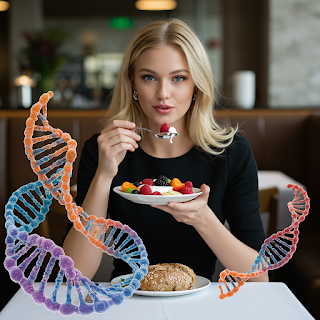The Role of Personalized Nutrition in Longevity
 |
| Fried Chicken Fit for Your Genes? Maybe. |
Why Personalized Nutrition Matters for Longevity
A one-size-fits-all approach to nutrition has its limitations. Variations in metabolism, gut microbiota, and even how nutrients are processed mean that what works for one person may not work for another.
For instance, omega-3 fatty acids are widely recognized for their anti-inflammatory properties and cardiovascular benefits. However, genetic variations in the FADS1 gene can influence how efficiently some people metabolize these fats into bioactive forms.
Similarly, the gut microbiome significantly affects how individuals respond to fiber. While fiber-rich diets generally promote heart health and reduce inflammation, the extent of these benefits depends on the specific composition of an individual’s gut bacteria.
By addressing such individual differences, personalized nutrition enables more targeted and effective interventions. For example, recommendations might include optimizing omega-3 intake for genetic variations or using specific probiotics to balance gut microbiota. These strategies ultimately promote longevity through improved health outcomes.

Genetics & Joy: Live Your Healthy Life.
Key Components of Personalized Nutrition

1. Genetic Profiling
Advancements in nutrigenomics, the study of how genes influence nutritional needs, are central to personalized nutrition. For example, research into the FTO gene highlights its role in regulating appetite and energy balance, providing insights into tailored weight management strategies. Genetic tests can also identify predispositions to conditions like type 2 diabetes, obesity, or nutrient deficiencies.
Individuals with variations in the MTHFR gene, for instance, may require higher intake of folate-rich foods or specific supplements due to impaired folate metabolism.
2. Metabolic Assessments
Understanding an individual’s metabolic rate and macronutrient processing is another key aspect of personalized nutrition. This is often achieved through blood tests, glucose monitoring, and advanced metabolic assessments.
For example, a person with insulin resistance may benefit from a diet emphasizing complex carbohydrates, proteins, and healthy fats while reducing simple sugars.
3. Gut Microbiome Analysis
The gut microbiome, often called the "second brain," profoundly impacts overall health. Testing the microbiome can uncover imbalances that influence digestion, inflammation, and mental health.
Personalized interventions might include tailored probiotics or prebiotic-rich foods, which have been linked to reduced risk of chronic diseases and enhanced longevity.
4. Lifestyle and Behavioral Insights
Lifestyle factors like physical activity, sleep patterns, and stress levels influence how the body processes nutrients. Personalized nutrition incorporates these elements to craft a sustainable, realistic plan.
For instance, a night-shift worker may need meal timing adjustments to align with their circadian rhythm, helping reduce the risk of metabolic disorders.

Berries & Yogurt: Personalized Food Power.
How Personalized Nutrition Promotes Longevity

1. Reduced Risk of Chronic Diseases
Chronic diseases, including heart disease, diabetes, and cancer, significantly impact longevity. Personalized nutrition helps mitigate these risks by addressing individual susceptibilities.
Someone genetically predisposed to high cholesterol might focus on soluble fiber and plant sterols, while another with high blood pressure may prioritize potassium-rich foods like spinach and bananas.
2. Enhanced Cellular Health
Tailored nutrition supports mitochondrial function and reduces oxidative stress, both crucial for cellular health and aging. A diet rich in antioxidants like vitamin C, vitamin E, and polyphenols can slow cellular damage, but personalized plans ensure optimal consumption tailored to individual needs.
3. Optimized Hormonal Balance
Hormones influence many aspects of aging, including metabolism and skin health. Personalized nutrition can address hormonal imbalances with targeted dietary and supplement choices. For instance, someone with low estrogen levels during menopause might benefit from foods like flaxseeds and soy products.

Nuts Fit Your DNA? Maybe a Perfect Snack.
Steps to Implement Personalized Nutrition for Longevity

1. Seek Professional Guidance
Collaborate with a registered dietitian or nutritionist experienced in personalized nutrition. They can interpret genetic tests, assess dietary habits, and develop a customized plan tailored to your goals.
2. Start with Small Changes
Adopting personalized nutrition doesn’t require a complete dietary overhaul. Begin with manageable steps, such as adding an extra serving of vegetables, replacing sugary snacks with nuts or fruit, or incorporating more whole grains. These incremental changes make the transition smoother and more sustainable.
3. Monitor Progress
Track changes in energy levels, digestion, and other health markers. Personalized nutrition evolves over time, requiring regular adjustments based on your progress and goals.
4. Stay Informed
As research in nutrigenomics and microbiome science continues to evolve, staying updated empowers you to make informed choices for your health.

DNA & Diet: Visualize Your Food Future.
Practical Tips for Everyday Longevity

- Focus on Whole Foods: Regardless of genetic differences, whole foods provide a solid foundation for good health. Prioritize fruits, vegetables, lean proteins, and healthy fats.
- Stay Hydrated: Proper hydration supports digestion, circulation, and cellular function.
- Balance Your Plate: Include a mix of macronutrients in each meal to maintain steady energy and support metabolic health.
- Practice Mindful Eating: Pay attention to hunger and fullness cues and avoid eating in response to stress or boredom.
The Future of Personalized Nutrition
The potential of personalized nutrition to revolutionize longevity is immense. Emerging technologies, such as AI-powered diet planning tools and microbiome-based therapies, are making tailored approaches increasingly accessible. For example, wearable devices now track real-time blood glucose levels, enabling precise dietary adjustments for individuals with insulin resistance or diabetes.
As more people adopt this individualized approach to eating, we can anticipate not only longer lives but also improved quality of life. By integrating science with an understanding of your body’s unique needs, personalized nutrition offers a sustainable path to vibrant health and longevity.
Read More About Longevity:
The Essential Connection Between Mental Health and Longevity: What You Need to Know
The Longevity Diet: Eat Your Way to a Longer, Healthier Life
Okinawan Wisdom for a Longer, Healthier Life
Eat These 10 Foods to Live 20 Years More
10 Supplements to Promote Longevity and Healthy Aging
The Future of Longevity: How Predictive Analytics and AI Are Changing Healthcare
The Healing Power of Nature: How the Outdoors Boosts Longevity and Well-being
Science of Longevity: Essential Supplements for a Longer, Healthier Life
The Longevity Effect: How Fermented Foods Can Transform Your Health
Rapamycin for Longevity: Miracle Drug or Risky Experiment?
Ozone Therapy: Benefits, Risks, and Longevity Potential Explored
How Social Connections Boost Longevity and Health: A Scientific Insight
Revolutionize Your Health: Dive Into The World of Biohacking
Superfoods That Promote Longevity: How to Live to 100 and Beyond
Ozempic and Longevity: Beyond Blood Sugar Control to Healthier Aging
Is Caloric Restriction the Key to Longevity? Exploring the Benefits and Risks
Comments
Post a Comment